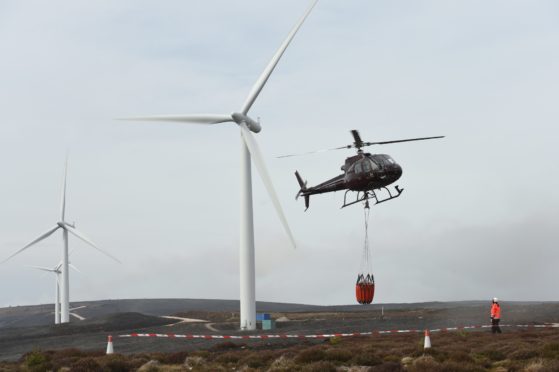Fire bosses in Moray have warned that the huge rise in blazes is expected to continue due to the “unprecedented” number of wildfires this year.
Figures revealed by the fire service last week showed that the number of call-outs to grassland and rubbish burning increased to 270 for 2018/19 – a rise from 117 the previous year.
Officers have blamed the stark rise on a large amount of wildfires last summer between Lossiemouth and Burghead.
Yesterday Martin Tait, the fire service’s senior officer for Moray and Aberdeenshire, said that about a third of the calls were received during June and July alone as the summer heat peaked – with many of the incidents related to “flare ups” from the same blaze.
Dave Scott, station commander for Moray, warned the high number of reported incidents was likely to continue next year following the massive blazes on Speyside a few months ago.
He said: “It’s hard to establish how many flare ups were involved in this but in April and May we experienced unprecedented wildfires across the UK.
“We were dealing with an area of approximately 80 square kilometres (30 sq miles) near Aberlour. The Saddleworth moor fire, which got national coverage, was 15 square kilometres (five sq miles) at its peak – which is quite a significant difference.
“The incidents went on for many days over a couple of months. One fire was open for two weeks. We sent a stop message but didn’t actually close down the incident.
“Flare ups were caused because visibly the fire was out but had buried underneath, it just takes certain wind or weather conditions to activate it again.”
The report from the fire service to yesterday’s meeting of Moray Council’s police and fire and rescue services committee stressed that the region continues to be below the Scottish average for reported incidents.
Conservative group leader Tim Eagle was anxious to see education for young people to cut down on deliberate fires in the area after reported concerns in Buckie.
He said: “The skate park is a minor example but we need to keep buying new bins because people keep burning them, which is very frustrating. It wouldn’t take much one summer for that to become a much bigger problem.”
Mr Tait said: “We see education of young people as crucial, not just for deliberate fires but also being safe in the home. We do a lot of work in the run up to school holidays, which is when the majority of fires we attend do occur.”
